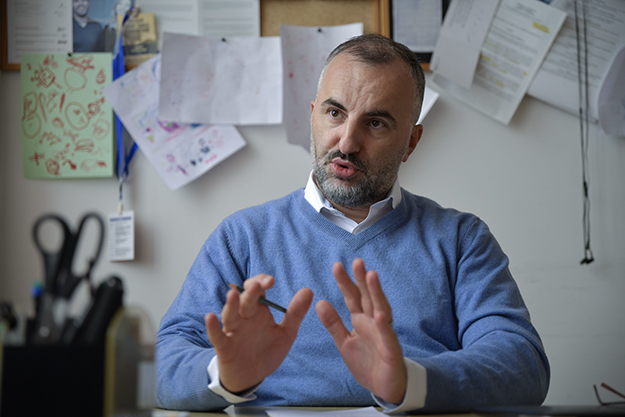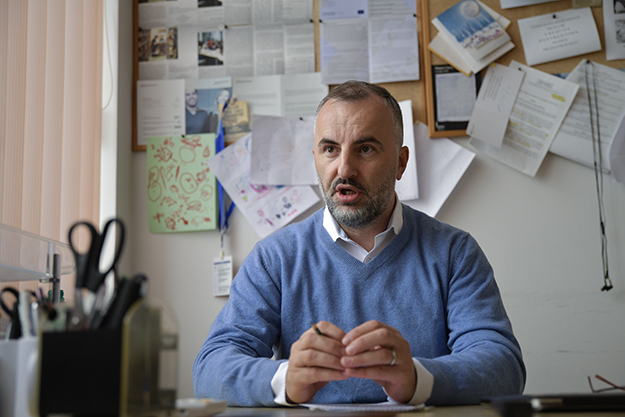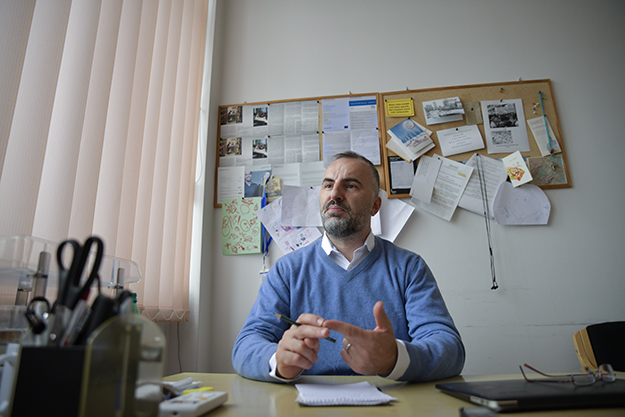In a recent interview, when asked about the state of democracy in her native Turkey, writer Elif Shafak warned of how the lack of independent academia, among other issues, is one of the components of a “damaged and broken” democracy.
Looking at the rest of the Balkans and at the state of democracy and academia, it’s a statement that strongly resonates. Around the region, universities are faced with the same complaints and challenges: the misuse of universities by political elites, a questionable quality of education, opportunism among the academic staff, a decline of ethics and the so-called “brain drain.”
Wanting to explore this situation further, K2.0 has spoken with some of the most prominent intellectuals from the region. In this special series of interviews with academics from seven Balkan states, all of the professors agree that academia in the Balkans is not independent.
To open our “Rethinking Academia” series, K2.0 spoke with Arben Hajrullahu, professor at the Department of Political Science at the University of Prishtina (UP), where he has lectured since 2006. He is renowned as one of the professors to have raised their voice against the misuse of universities.
As such, Hajrullahu — who completed his PhD studies at the University of Vienna, became one of the first people in Kosovo to acquire the epithet of a whistleblower — a category that has been protected by law since 2018. However, in an earlier interview with K2.0, he said that he does not consider himself to be a whistleblower, but a “professor who attempts to fulfill his obligations with responsibility and academic integrity.”
In early 2017, after he was passed over for promotions in the university, Hajrullahu stated that the discrimination against him was directly related to him challenging the misuse of the university.
K2.0 sat down with him and talked about problems of political interference, opportunism and what steps could be taken to increase the quality of Kosovo’s academia.

Photo: Atdhe Mulla / K2.0.
K2.0: Can we start by getting your impressions of the situation with our academia; so your perspective on the condition of our intellectual corpus, especially those who are part of higher education and the University of Prishtina?
Arben Hajrullahu: At the university where I work, I have been followed by great scandals through the years. Besides the problem that is the perpetrators of the scandals, I think that even more problematic is the lack of will — the opportunism of the mass of academic staff within the university, which is the same, analogously, in other universities, institutions and academies — to challenge wrongdoings.
For example, we have scandalous developments regarding the promotion of professors, different wrongdoings. Then we had the protests of late 2013.
Of the approximately 1,000 people that comprise the academic staff of UP, only a handful have had the courage to fulfill their intellectual obligation by issuing public statements on the situation. So the problem and challenges are not only related to the wrongdoers, but also to the silenced mass, who I don’t think are necessarily opportunists just because they don’t speak up.
However, the system is built in such a way that if you do fulfill your professional and intellectual duty and speak up for certain issues of public interest, issues related to the university, the academy, education, you risk putting yourself in trouble.
In the years after 1999, a system of clientelism toxic for the development and advancement of education, of academic and intellectual life, has been embedded. It was created in an analogous way, just as in politics. It is a type of clientelism in which silence, complemented by misuse and manipulation, is awarded in different ways — with honorariums, promotions.
Accessing political parties is often automatically tied to promotions in universities. As such, a trap has been created, a vicious cycle that is difficult to break solely by using internal powers.
We have to mobilize policy-makers and decision-makers, so as to liberate not only the academic system, but the entirety of the education system.
You cannot fight wrongdoings solely through internal powers, because wrongdoing as a term in the academic world includes much more than just elements of corruption. For example, dishonorable conduct, promotion achieved through falsification, paying for nonsensical academic research studies, misusing the public sphere and people who should be doing science and developing critical thought flirting with daily politics.
So we are in a trap that we have to fight through comprehensive social mobilization. We have to mobilize people who have the capacity, knowledge, intellect but also good will, because it is not enough to have high intellect, as it can also be used for evil deeds, making it damaging.
We have to mobilize policy-makers and decision-makers, so as to liberate not only the academic system, but the entirety of the education system.
In November 2015, Democracy for Development (D4D) published a report that noted nine great challenges that face UP, such as a shortage of quality staff, the politicization of student organizations, unmerited promotions, etc. Why are these issues still very current and present at UP, four years after the report was published?
I am afraid that four, eight or 40 more years will pass and we won’t manage to take a meaningful step toward better quality and development if there is no will to do something about it. First of all, we cannot expect a miracle, and we must start with the issues that come first.
The starting point should be the scrutiny of all academic staff, starting with myself, and then to move on from branch to branch, faculty to faculty, so as to ultimately cover the entire university. And not only in Prishtina, but also in public universities in other cities and private higher education institutions. We must identify whether there are clashes of basic principles of ethics and academic integrity and if so, we must identify the severeness of these violations.
We have concrete cases in which academic staff — professors, branch managers — were heavily involved in plagiarism. Some even acquired PhDs in this way, so this reaches the highest levels. We must review the background of every member of academic staff and, if necessary, it is better to temporarily close a branch of study until academic capacities are created. It is better to be without certain fields for a few years, so that tomorrow we can provide students with knowledge and quality.
A bomb has been planted in our society. When students reach the ages of 25 to 30, they will realize that they have no skills with which they can compete in the labor market, and having acquired degrees after studying for six to eight years, they will naturally not want to work random jobs that require low levels of qualification.

Photo: Atdhe Mulla / K2.0.
So a bomb has been planted in our society. Professors who contributed to this by passing students in exams without criteria are heavily responsible. These bombs explode in different forms, as was the case with the 2015 exodus of hundreds of thousands of Kosovars. Years after being liberated, Kosovars found themselves drowning in the waters of the border zone between Vojvodina and Hungary.
An example that illustrates the situation: We had a case where in an irregular exam period — November 2015 — a rectorate official finished the first, second and third years and graduated, all within a week!
The lack of transparency and accountability is morbid. It is fatal for quality in education and academia. So the scrutiny of academic staff is the key word, but this does not happen by itself, because the wrongdoers have established themselves in key positions within the university and they collaborate with politics, which naturally does not clean itself.
Let’s move on to universities that have been established in other cities around Kosovo, such as Prizren, Peja and Mitrovica. It has often been said that the establishment of these universities represents an attempt to secure a sort of social peace. Now, after three universities have had their accreditations suspended for a period of one year, how did you see their establishment in the beginning and what is your opinion of them now?
We cannot open universities during electoral campaigns. We must look into what we can do in this situation. It’s easy to say that they must be closed, but we must look into opportunities to implement reforms and transform them into professional institutions.
As for the suspension of their accreditations, it seems that there is someone who is checking and attempting to increase the quality of studies, which is a good sign. So in general, this represents a heavy blow to higher education in Kosovo, which came as a result of short-term policies that established universities during campaigns, but did not finance them afterwards.
If they were serious about the promises they made during the campaigns, they would facilitate an increase in capacity, not only infrastructural capacity, but also the capacity of the apparatus of professors.
Science and universities are, above all, about content and form. These universities should have served the needs of society by connecting education and professional training with the economy. We have not invented anything new. Developed societies did this way before us.
In this case, public funds have been misused in these universities, while in the past we had cases in which politics interfered with the work of universities. Such was the case when the UP was named after the renowned figure Hasan Prishtina. This was done through manipulation, without prior internal consultation.
While this is just a symbol, it is important to note because it can help us understand the mentality of the people who have led the university into the condition in which it is today.
You mentioned political interferences in the university. There is a general agreement that universities are politicized. We see student organizations that often resemble party clans, which are often deeply integrated into the decision-making system of the higher levels of the university. How has politics been installed in universities and in which ways does this harm the university?
If we look into the history of the development of UP, we know that in the ’70s and ’90s, the UP had a parallel political role. After the liberation of Kosovo in 1999, we should have been able to take a step forward by separating the university from politics. The university has different duties.
You’re saying that the influence of politics on the university is inherited?
This was the mentality. What happened before ’99 influenced the continuation of this phenomenon after ’99, although naturally, the circumstances were completely different.
The organization of lectures in the ’90s was not done solely with the purpose of providing knowledge to students, it was also a politicum, an act of political expression against the regime, against the prevention of learning and teaching in the mother tongue.
The people who are mainly responsible for the condition of academia are becoming so wealthy that it is difficult for them to justify the source of such wealth.
If we want to have normal universities, like there are in the developed world, we must ensure the autonomy of universities. Autonomy is often misunderstood, intentionally or unintentionally, because autonomy does not imply anarchy in universities.
Universities are not there to be included in political campaigns. Just look at how many professors there are at the UP who before noon — now that we are in the pre-election period — go to political party meetings, and in the afternoon come to the auditoriums and pretend to do science. This is problematic even in natural sciences, and even more so in social sciences, which are related to politics.
I’m not implying that academic staff cannot be involved in politics, but the developed world has regulated this. For example, we have a case where an individual has “frozen” their position within the university for 15 years! Here they save their places, while students suffer from the absence of their professors in lectures. In the U.S. and many other Western countries, if a professor decides to follow another professional path, even if it is in politics, they are given priority at their place of work for a period of four to six years, but afterwards they must decide whether they want to leave the job or teach again.
Our country is also suffering from brain drain. The people who are mainly responsible for the condition of academia are becoming so wealthy that it is difficult for them to justify the source of such wealth. In fact, their children do not study in these universities, rather they study in universities where you have to pay to study, or where you pay to acquire a diploma, and don’t study at all.
There is an eternal debate in the academic world, also outside of Kosovo, about whether there is a positive inclusion of politics in universities. How do you see this? Does a suitable, legitimate and healthy mass of political influence exist in academia?
You need an efficient system of accountability. For example, you need to justify the millions of euros that we spend here in our universities — why we spend them, what we do with them. Someone needs to be held accountable.
The cost per student at the UP is 400-500 euros per year, while students pay 50 euros per semester. Private universities must also have the same level of transparency, because even though the funds are private, universities that issue academic degrees must be held accountable just like public universities are.
We had one case at the UP in which a person with a political background was running in elections to become a minister, then later on to become a deputy, but after failing to get elected, was appointed as rector of the UP, despite the political influence. Later it was revealed that he became a professor as a result of dubious publications in unreliable journals in India, and he continues to work as a professor, as if nothing happened.
These issues are best regulated by installing a system of accountability, which is currently lacking.
Some private universities have been transformed into important elements of higher education. How do you see their current level of quality? Does it need improvement?
In developed countries, private education institutions that require tuition provide higher quality education than public institutions. This isn’t the case in Kosovo. There are strong indicators that many of them have sold diplomas without any criteria.
First of all, private institutions should be non-profit institutions, which is not the case in Kosovo. In the developed world, private universities are created as associations for public interest, and the funds that are generated are not used for the enrichment of individuals. We are far from this. In our country, they serve more like kebab shops — you get as much as you want, if you have the money. That is how they have operated for a long time. They must undergo review by accreditation institutions and must not be treated any different than public universities.
The inspection of professors must also happen in these institutions. They must not be used for material profit. Tuition payments must be used to increase the level of quality, but indicators show that most of them are weaker than public universities.
In the election campaign that is now underway, politicians have stated that the main problem in education is the lack of qualified personnel. You’ve talked about this issue previously as well. What is, in your opinion, the easiest way to reform the faculties, and does Kosovo have people who can fulfill the requirements of such reforms?
We have the people to at least start the processes properly.
The first step is inspection. The second step, which might take more time, is financing new staff and initiating a process that is known as brain circulation.
I’ve had students in Prishtina who became professors in European universities. There are others who are very interested in cooperating in different ways with Kosovar institutions, in the worst case scenario, by providing their input without being included in the system.
There is a prevalent insulting mentality in our institutions that individuals who are well-prepared professionally do not want to return to Kosovo, while those who want to return are not, that they return because they cannot compete in European countries. I am not saying that those who study abroad are per se more competent than those who study here, but I’m saying that we have very few people and therefore do not have the luxury to act in such an irresponsible manner toward individuals who have studied at European universities.
We have many cases in which UP “successfully” expelled dozens of people who could have contributed greatly, much more than those we see installed in faculty positions today. They were mainly arbitrarily expelled because they were people who could not be controlled by politics, who didn’t want to serve this system, who didn’t want to use the mafioso lexicon — “Yes, boss,” “Here you go, boss” or “Pronto.”

Photo: Atdhe Mulla / K2.0.
Kosovo is nearing the end of the second decade after the war. It is in a sensitive, perhaps historic position regarding state processes and attempts to reach an agreement with Serbia and to move on from the status quo in international politics. What role have the university and academy taken in this process? What should their role be?
You said the second decade… This made me recall the impression that I have that great steps and changes in Kosovo and in this part of the world happen in decade cycles.
For example, all processes during the ’90s and the international administration of the first decade of the new century, then the decade of the collective greed and gluttony of the usurpers of the public sphere; there are indicators that the end could be near. Considering the logic of decade cycles, perhaps a new development could occur.
The university should provide its expertise in certain fields, such as the legal field, but for this to happen we need political will, because it takes two to tango. The most knowledgeable person who leads the country is not omniscient. The university can provide expertise in many fields, but this should not be done to please those who are being advised. It should have a scientific basis, and should not be determined by the demands of political leaders.
You have worked as a professor at UP for many years. What positive developments have we seen through the years? What are the main points that bring hope for the university?
Until now, we have spoken about the half empty part of the cup. So it’s good that we are talking about this as well. I can say that there have been many positive developments, and I think it would be unfair not to highlight this.
After the complete destruction of infrastructure and dispersion of staff, UP recovered quickly. First of all, the physical infrastructure has been stabilized and we are now mainly talking about improvements in quality.
In 2004, I came to UP for the first time from Austria, as part of a brain gain program. I was a guest lecturer, but I have remained since then. Regarding the quality aspect, we are much better today. There is no comparison to those years. The development of the electronic grading system (SEMS) has removed the index and limited possibilities for manipulation.
A very positive phenomenon is that in these circumstances, students are publishing in prestigious international institutions.
We had a case in which a student falsified 12 of her grades as well as the signatures of her professors in her index; years later, I was notified by the court that the case had been prescribed [the statute of limitations expired]. When she graduated, I noticed that she had falsified the grade that she had in my subject, but for my professor colleagues, silenced opportunists, it was not worth addressing the issue, since the student had political ties.
A good part of the criticism against the university is simply dishonest. UP professors are required to achieve the level of European universities, but financial support for scientific research is not at the right level. I’d like to see more transparency. A good example would be to functionalize electronic equipment for studying, so that students could have easier access to lectures through internet-based systems.
There is also little genuine research. The university generally does not facilitate research; in the ’70s, there were many more publications from the printing house of the University of Prishtina.
A very positive phenomenon is that in these circumstances, students are publishing in prestigious international institutions. This is based more on their quality and individual work, rather than support from the university. So the situation is not all black and not all white.
However, for many important issues, there is a lack of managerial courage, as in the case with exam periods, where in addition to the three regular periods in January, June and September, there are two irregular periods in which professors hold exams based on their arbitrary will.
It is a chain of problems. Very few come here to study, they rather just come to graduate, and that is an essential difference.
This conversation has been edited for length and clarity. The interview was conducted in Albanian.
This is the first of seven One-on-one interviews in our “Rethinking Academia” series on the state of higher education in the region.
Feature image: Atdhe Mulla / K2.0.





In the United States there are laws that protect students from political and potentially harmful actions of faculty in education environments. Look at FERPA, The Family Educational Rights and Privacy Act (www2.ed.gov/policy/gen/guide/fpco/ferpa/index.html). Among the guidelines, for example, is the regulation of the use of social media by individual faculty that engages or shows students for personal gain, pressure or influence. A system to establish rights and codes of conduct that is enforceable is needed. Waiting for compliance is not enough.